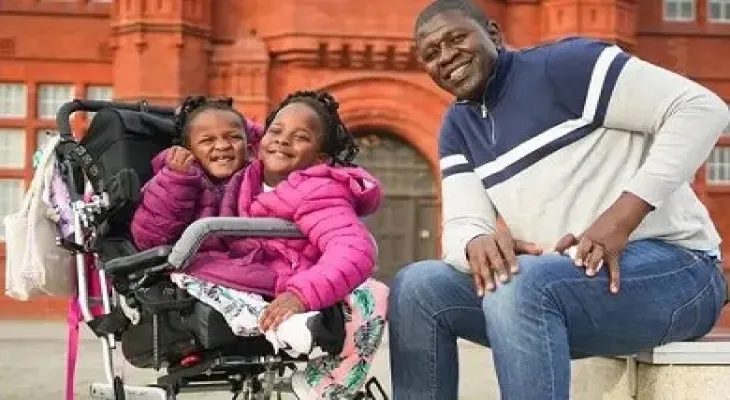Search here
Newspaper
Search here

Arab Canada News
News

Published: February 24, 2024
Maryam and Nada were not expected to live more than a few days at birth. They are now 7 years old and are the only surviving conjoined twins in Europe.
While the girls have their unique personalities and moods, they rely on each other for survival.
Their father Ibrahima said, "When you are told from the beginning that there is no future, you live only in the present."
Conjoined twins are rare, representing one case in every 500,000 live births in the United Kingdom.
About half of them are born dead, and a third die within 24 hours of birth.
So seeing Maryam and Nada celebrate their seventh birthday with a group of friends not only brings happiness to Ibrahima but also to the doctors who cared for them.
Maryam and Nada share one pair of legs and one pelvis, but each has a spinal cord and a heart.
They receive round-the-clock care but attend a regular school in South Wales with their friends.
Ibrahima said, "They are fighters and prove that everyone was wrong."
He added, "My daughters are completely different. Maryam is very quiet, an introverted personality, but it is completely different with Nada; she is very independent. I do not claim that it is easy, but it is a great privilege. You feel lucky to witness this ongoing battle for life."
When the twins were born in Senegal in 2016, their parents were expecting one child. Doctors did not expect them to live longer than a few days.
Ibrahima told the BBC documentary Unstoppable Sisters: "I was preparing myself to lose them very quickly, and the only thing we could do was to be by their side and not let them walk alone through this journey. We clearly saw very early that we were dealing with fighters clinging to life."
The best chance of survival is believed to be separation.
After following up with hospitals around the world "begging" for help, the family arrived in the UK to receive treatment at Great Ormond Street Hospital in London in 2017.
Ibrahima hoped that the famous children's hospital, which had separated the most conjoined twins in the world, could separate them and that they could return home to their brothers and sisters in Dakar, but that was not the case.
Tests found that Maryam's heart was too weak to allow for a complex surgical operation.
Medical experts warned the family that without separation, neither daughter would survive more than a few months.
But doctors advised that separation would give Nada the best chance of survival.
Ibrahima said at the time, "It was killing one of my children for the other, and that is something I cannot do."
He continued, "I cannot allow myself to choose who lives and who dies now."
When their mother returned to Africa to care for their other children, Maryam, Nada, and Ibrahima stayed in the UK to receive medical care, and the three moved to Cardiff.
Ibrahima, a former managing director of a tourism company in Senegal, said: "Not being able to go back home was very difficult because you had the rest of your family and your job in your homeland."
He added, "But I did not think much, I just followed my heart; it is my parental responsibility to be by their side, and that will be my life's goal.”
The twins need regular hospital checkups because they are at risk of infections and heart failure.
Dr. Gillian Bodie, a pediatric consultant at the University Hospital of Wales, said: "At first it was a bit exciting, then I realized this was something I had only read about in textbooks."
Dr. Bodie added, "They have one pair of legs and one pelvis, and moving upward through their abdomen, we have many different organs, we don’t know exactly, but we know that some parts are shared and some parts are separate."
She continued, "They have two separate spinal cords with all their nerves, but they somehow fully coordinate, and they don’t have to tell each other how to move their arm or how to move the leg."
Clothing the twins is a challenge.
Ibrahima said, "You have to buy two identical shirts and take them to a tailor to sew them together."
He added, "They have two legs, so they can wear normal trousers, but the pelvis is very wide so you have to take it to the tailor for adjustments."
The family is now integrated into their community in Cardiff and the twins are cared for day and night as caregivers assist the father with respite support.
They are currently in the third grade at the local primary school, where the twins receive help from two support workers.
Ibrahima said, "I want them to live a normal life, to play and laugh with children, to have friendships, and to develop as individuals."
He added, "They don’t have to hide from anyone, and being in regular schools shows they are part of the community and that they are lucky to be part of this community."
The next challenge facing Maryam and Nada is trying to stand and walk; they are currently trying about 20 minutes a day with the help of a standing frame.
Ibrahima said, "They have achieved things no one thought they would achieve."
Ibrahima added, "When you are told from the beginning that there is no future, you live in the present."
He continued, "I know that at any time, I can get a call informing me that something bad has happened. How long will this situation last? I do not want to know; we will make every day a surprise and celebrate life. It might be contradictory, but you feel lucky despite the hardships you face; they bring me so much happiness, it is a great blessing to be their father."
Comments